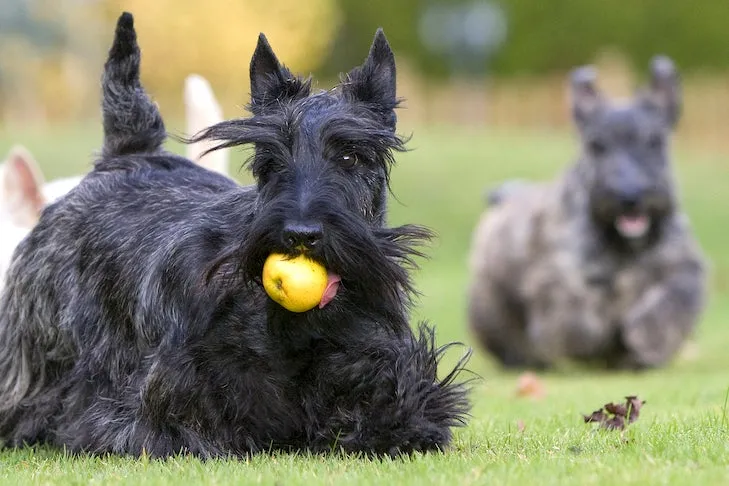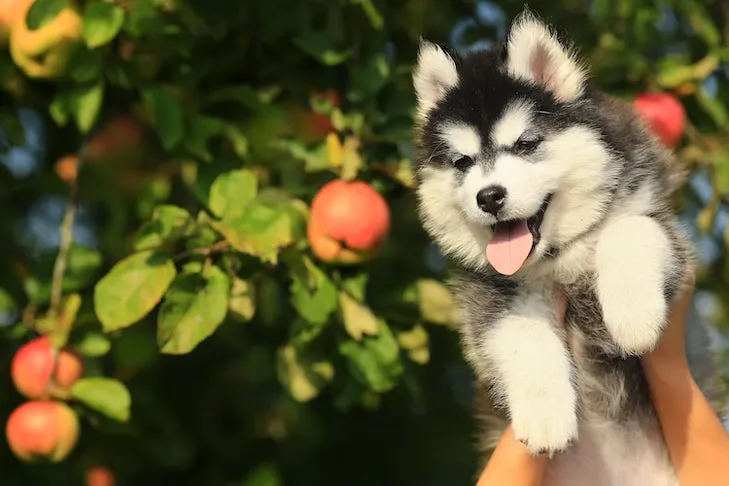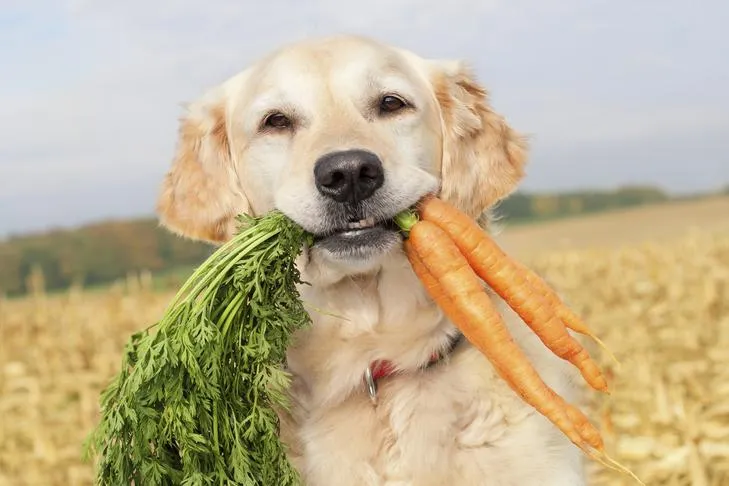It’s natural to want to share your favorite human snacks with your beloved canine companion. After all, if a fruit is healthy for you, it must be perfectly safe for your dog, right? Not necessarily. Dogs digest foods very differently than humans, and some seemingly innocent fruits can be unhealthy, or even downright dangerous, for them. Understanding which fruits are safe and which should be strictly avoided is critical for your dog’s long-term health and safety. While dogs, as omnivores, don’t strictly require fruits or vegetables as a core part of their diet, certain dog-safe options can make excellent, nutritious treats when given in moderation.
This comprehensive guide from Dog Care Story will help you navigate the world of fruits and vegetables for dogs, outlining which ones are okay to share as occasional treats and, more importantly, What Fruits Should A Dog Not Eat to prevent potential health problems. We’ll also touch on some common vegetables, providing a holistic view of plant-based foods that are safe or unsafe for your furry friend. When it comes to your dog’s diet, knowledge is power – and safety is paramount. Learning about what ingredients should dogs not eat in general can empower you to make the best dietary choices for your pet’s well-being.
Understanding Your Dog’s Dietary Needs
Dogs have evolved to thrive on a balanced diet of proteins, fats, and carbohydrates, along with essential vitamins and minerals. While their digestive systems can process some plant matter, they are not designed to handle large quantities of fruits and vegetables, especially those with high sugar content or specific toxins. Treats, including fruits and vegetables, should always be given in moderation, making up no more than 10% of your dog’s daily caloric intake to prevent nutritional imbalances or excessive weight gain. Always introduce new foods slowly and in small amounts to observe for any adverse reactions.
Fruits Dogs Can Enjoy Safely
When given in moderation and prepared correctly, many fruits can offer your dog a burst of vitamins, minerals, and antioxidants, serving as a healthy and delicious treat. Remember to always remove any pits, seeds, or tough skins, as these can be choking hazards or contain toxic compounds.
Apples
Apples are an excellent source of vitamins A and C, and a good dose of fiber for your dog. Their low protein and fat content make them an ideal snack, particularly for senior dogs. Always be sure to remove the seeds and core first, as apple seeds contain small amounts of cyanide. For a refreshing treat, try them frozen on a warm day, or look for apple-flavored dog treats.
 Scottish Terriers playing energetically in a lush green park
Scottish Terriers playing energetically in a lush green park
Bananas
Bananas are a fantastic low-calorie treat for dogs, rich in potassium, vitamins, biotin, fiber, and copper. They are also low in cholesterol and sodium, but due to their naturally high sugar content, they should be offered sparingly as an occasional treat rather than a regular part of your dog’s main diet. You can find ready-made banana dog treats as a convenient option.
Blueberries
Often hailed as a superfood for both humans and canines, blueberries are packed with antioxidants that help prevent cell damage. They are also a good source of fiber and phytochemicals. Their small size makes them perfect for training rewards or even for teaching your dog to catch treats in the air. Many blueberry dog treats are available, sometimes combined with other beneficial ingredients like yogurt.
Cantaloupe
This juicy melon is loaded with nutrients, low in calories, and provides a great source of water and fiber, making it hydrating for your dog. However, cantaloupe is high in sugar, so it should be given in strict moderation, especially for dogs who are overweight or have diabetes. Freezing small cubes of cantaloupe can create a delightful and refreshing summertime snack.
Cranberries
Both fresh and dried cranberries are safe for dogs in small quantities. While some dogs might find their tartness unappealing, moderation is key to avoid an upset stomach. It’s important to choose unsweetened fresh or frozen cranberries, as many dried varieties sold for humans contain added sugars that dogs don’t need. Crunchy cranberry dog treats are another alternative for cranberry benefits.
Cucumbers
Cucumbers are an excellent choice for dogs, particularly those who are overweight, as they contain almost no carbohydrates or fats and are full of hydrating water. They are also rich in vitamins K, C, and B1, along with potassium, copper, magnesium, and biotin. Cool cucumber slices can be a fantastic hot weather treat, and frozen slices offer a fun enrichment snack.
 A funny Russell Terrier with cucumber slices covering its eyes
A funny Russell Terrier with cucumber slices covering its eyes
Mango
This sweet, tropical fruit is a powerhouse of vitamins A, B6, C, and E, plus potassium and beneficial beta-carotene and alpha-carotene. As with most fruits containing a large seed, the hard pit of a mango must be removed before offering it to your dog, as it contains small amounts of cyanide and poses a choking hazard. Due to its high sugar content, mango should be an occasional treat, particularly for dogs managing their weight. Mango-flavored dog treats offer a less messy way to provide these nutrients.
For dogs needing to gain weight or with specific dietary needs, it’s always important to consider balanced options. Understanding what human food can dogs eat to gain weight involves careful selection to ensure healthy weight gain without introducing harmful ingredients.
Oranges
Veterinarians generally agree that oranges are fine for dogs to eat, although many dogs are deterred by their strong citrus smell and taste. Oranges are a great source of vitamin C, potassium, and fiber. In small amounts, the juicy flesh can be a tasty treat. It’s crucial to remove the orange peel and any seeds, as the peel can be rough on their digestive systems, and the oils might upset your dog’s sensitive nose. If fresh oranges aren’t a hit, there are dog treats that incorporate orange flavor.
Peaches
Small amounts of fresh or frozen peaches, with the pit entirely removed, can be a good source of fiber and vitamin A for your dog. Just like cherries, peach pits contain cyanide and can be a serious choking hazard, so ensure they are safely discarded. Avoid canned peaches entirely, as they are typically packed in sugary syrups. Even those “in natural juice” usually contain more sugar than any dog needs. Frozen peach slices can offer a refreshing treat during warmer months.
 A cute Siberian Husky puppy being held near an apple tree branch
A cute Siberian Husky puppy being held near an apple tree branch
Pears
Pears are a healthy snack for dogs, rich in copper, vitamins C and K, and fiber. When sharing pears, make sure to cut the flesh into bite-sized chunks and remove the pit and seeds, which contain traces of cyanide. As with peaches, avoid canned or jarred pears that come with sugary syrups. You can also find pear dog treats that sometimes include other beneficial ingredients.
Pineapple
A few chunks of fresh pineapple can be a sweet and hydrating treat for dogs, provided the tough, prickly outer peel and crown are removed. This tropical fruit is full of vitamins, minerals, and fiber, and it contains bromelain, an enzyme that can aid in protein absorption. Again, skip canned or packaged pineapple in sweetened syrups to avoid unnecessary added sugars in your dog’s diet, especially for those prone to obesity. Pineapple dog treats are also available for a tropical taste on the go.
Pumpkin
Pure pumpkin is an exceptionally healthy food for dogs. It’s brimming with antioxidants, and its standout benefit is its ability to help relieve both diarrhea and constipation in dogs, acting as a natural digestive aid. If you’re using canned pumpkin, always ensure it’s 100% pumpkin puree, not pumpkin pie filling which contains added sugars and spices. You can also roast fresh pumpkin and feed the peeled flesh to your dog. Numerous pumpkin supplements and treats are also popular options for canine enjoyment.
Raspberries
Raspberries are safe for dogs in moderation and offer a good source of antioxidants. They are low in sugar and calories but high in fiber, manganese, and vitamin C. Raspberries are particularly beneficial for senior dogs due to their anti-inflammatory properties, which can help support aging joints. However, raspberries contain small, naturally occurring amounts of xylitol, so it’s essential to limit your dog to no more than 8 ounces of fresh or frozen raspberries to be safe.
Strawberries
Strawberries are rich in fiber and vitamin C, and they contain an enzyme that may even help whiten your dog’s teeth. Like all fruits, strawberries contain natural sugars, so they should be offered in moderation. Frozen strawberries can be a fun and cooling enrichment treat for dogs. If your dog enjoys the flavor, many strawberry-flavored training treats are available.
 A curious Pembroke Welsh Corgi puppy sniffing a fresh strawberry
A curious Pembroke Welsh Corgi puppy sniffing a fresh strawberry
Watermelon
Dogs can safely eat watermelon, but it’s crucial to remove the rind and all seeds first, as these can cause intestinal blockage. The flesh of watermelon is safe and packed with vitamins A, B-6, and C, as well as potassium. Being 92% water, it’s an excellent way to help keep your dog hydrated on hot summer days. Freezing chunks of seeded watermelon makes a refreshing hot-weather treat, and watermelon-flavored dog treats are also a popular choice.
What Fruits Should a Dog Not Eat? Avoid These Dangerous Options
While some fruits are beneficial, others can contain compounds, seeds, or parts that are dangerous, if not toxic, to dogs. It is imperative to keep these fruits completely out of your dog’s reach to ensure their safety and prevent potentially life-threatening situations.
Avocado
Though avocado is a healthy snack for many people, it should never be given to dogs. The pit, skin, and leaves of avocados contain persin, a toxin that can cause vomiting and diarrhea in dogs. While the fleshy inside of the fruit has less persin, it can still be too much for a dog’s sensitive system. Avocado flesh is also high in fat, which can lead to gastrointestinal upset or contribute to serious health conditions like pancreatitis if consumed in large quantities. If you wish for your dog to benefit from avocado’s healthy fats, look for dog treats specifically designed for skin and coat health that include avocado as an ingredient. For dogs who may be experiencing gastrointestinal issues, knowing what to feed dog if sick becomes even more critical.
Cherries
With the exception of the fleshy fruit itself, cherry plants, including the leaves, stems, and especially the pits, contain cyanide and are toxic to dogs. Cyanide disrupts cellular oxygen transport, meaning your dog’s blood cells cannot get enough oxygen. If you have a cherry tree, ensure your dog doesn’t have access to fallen fruit. If your dog consumes whole cherries or cherry pits, watch for severe symptoms like dilated pupils, difficulty breathing, and red gums, which indicate cyanide poisoning and require immediate veterinary emergency care. When enjoying cherries yourself, always secure discarded pits in a dog-proof trash can. For safe antioxidant benefits, consider cherry-flavored dog treats.
Grapes & Raisins
Grapes and raisins are highly toxic to dogs, regardless of breed, sex, or age. Even a small amount can lead to acute sudden kidney failure, which can be fatal. If you suspect your dog has eaten any amount of grapes or raisins, call your veterinarian immediately. Always be vigilant about this dangerous fruit, especially if children in your home eat them. Ensure all grapes and raisins are securely stored and disposed of in dog-proof containers, never in an accessible compost heap.
Tomatoes
While the ripened red flesh of a tomato fruit is generally considered safe for dogs, the green parts of the tomato plant—including the leaves, stems, and unripe green tomatoes—contain a toxic substance called solanine. Although a dog would typically need to consume a significant amount of the plant to become truly sick, it’s generally best to avoid feeding tomatoes altogether to be safe. If your dog enjoys exploring your garden, prevent them from accessing tomato plants.
 A thoughtful Rottweiler dog lying in a green backyard with its head tilted
A thoughtful Rottweiler dog lying in a green backyard with its head tilted
Safe Vegetables for Dogs: A Healthy Addition
Just like fruits, many vegetables can be a healthy and nutritious addition to your dog’s diet when given correctly. They provide fiber, vitamins, and minerals without excessive calories.
Broccoli
Broccoli can be safe for dogs in small amounts and is best served as an occasional treat. It’s high in fiber and vitamin C and low in fat. However, broccoli florets contain isothiocyanates, which can cause mild to severe gastric irritation in some dogs. Additionally, tough broccoli stalks can pose a choking hazard or cause esophageal obstruction. It’s generally recommended to offer cooked broccoli to help mitigate these issues.
Brussels Sprouts
Brussels sprouts are loaded with beneficial nutrients and antioxidants for both humans and dogs. However, be cautious not to overfeed them, as they are well-known for causing excessive gas in dogs. If your dog enjoys them and you can manage the “results,” dehydrated dog foods sometimes include these leafy greens.
Carrots
Carrots are an excellent low-calorie snack, rich in fiber and beta-carotene, which the body converts to vitamin A. The crunchy texture of this orange root vegetable is also great for helping to clean your dog’s teeth. Carrots are a common ingredient in many commercial dog foods and numerous carrot-flavored dog treats.
 A Golden Retriever dog gently holding several raw carrots in its mouth
A Golden Retriever dog gently holding several raw carrots in its mouth
Celery
In addition to vitamins A, B, and C, celery contains nutrients that can promote heart health and potentially help fight cancer. An added bonus: celery is known to help freshen doggy breath. Celery dog chews are a popular option for dogs who enjoy the crunch.
Green Beans
Chopped, steamed, raw, or canned (plain, without added salt) – all types of green beans are safe for dogs to eat. They are packed with essential vitamins and minerals, full of fiber, and low in calories, making them a great snack or food additive. Frozen green beans can also be a fun and healthy enrichment treat.
For specific breeds, dietary considerations can be even more important. Learning about what can bichon frise not eat for example, highlights how breed-specific sensitivities might influence safe food choices.
Peas
Green peas, snow peas, sugar snap peas, and garden or English peas are all generally safe for dogs to eat occasionally. Peas contain several vitamins, minerals, are rich in protein, and high in fiber. You can feed your dog fresh or frozen peas, but always avoid canned peas that contain added sodium.
Spinach
Dogs can technically eat spinach, but it’s not considered one of the top vegetable choices for them. Spinach is high in oxalic acid, which can interfere with the body’s ability to absorb calcium and, in very large amounts, could potentially lead to kidney damage. While your dog would likely need to consume a substantial quantity of spinach to experience such problems, it might be safer to opt for other vegetables. If you still want your dog to get the benefits of this leafy green, spinach dog treats are available for occasional snacking.
Vegetables Dogs Must Avoid
Just as with fruits, certain vegetables are harmful or even toxic to dogs and should never be part of their diet. Knowing these can prevent serious health issues.
Asparagus
While not inherently unsafe for dogs, asparagus offers little to no real benefit. It’s quite tough when raw, and by the time you cook it down to a soft, digestible texture for dogs, much of its nutritional value is lost. If you’re looking to share a vegetable with your dog, there are many other more beneficial and palatable options available.
Mushrooms
Wild mushrooms can be extremely toxic and even fatal for dogs. Of the thousands of mushroom species worldwide, many are poisonous, and it can be difficult to distinguish them from safe varieties. Therefore, all wild mushrooms should be considered a strict no-go for dogs. Washed mushrooms purchased from a supermarket for human consumption are generally fine, but given the risks, many pet owners choose to avoid them entirely to prevent accidental consumption of a dangerous wild variety.
Onions, Leeks, & Chives
Dogs should never, under any circumstances, eat onions, leeks, or chives. These vegetables belong to the Allium family and are poisonous to most pets, especially cats. Consuming any part of these plants can cause your dog’s red blood cells to rupture, leading to a condition called hemolytic anemia, and can also cause vomiting, diarrhea, and stomach pain. Poisoning from these alliums can be more severe in Japanese breeds like Akitas and Shiba Inus, but all dogs are highly susceptible. If you have children, ensure they understand not to share foods containing these ingredients with your dog, and always secure leftovers where your dog cannot access them.
When your dog is unwell, a carefully chosen diet is crucial for recovery. For instance, what is good to feed a sick dog often involves bland, easily digestible foods that support healing without causing further upset.
Conclusion
Navigating the world of human foods for your dog requires careful attention and knowledge. While sharing healthy, dog-safe fruits and vegetables can be a wonderful way to offer nutritious treats and enhance your bond, it’s even more vital to understand what fruits should a dog not eat to protect them from potential harm. Always remember that moderation is key, even with safe foods, and proper preparation, such as removing pits, seeds, and tough skins, is essential.
If you are ever unsure about whether a particular fruit or vegetable is safe for your dog, or if you suspect your dog has consumed a toxic food, consult your veterinarian immediately. They are the best resource for personalized dietary advice tailored to your dog’s specific health needs. For more comprehensive insights and trusted advice on pet care, continue to explore the valuable resources available at Dog Care Story.
